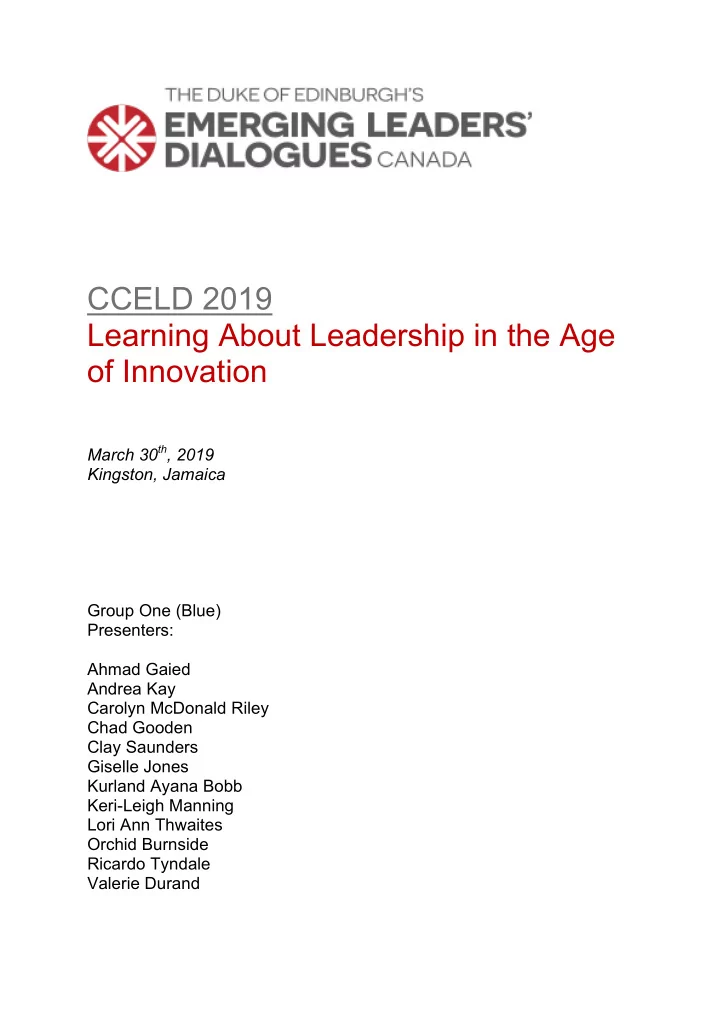

CCELD 2019 Learning About Leadership in the Age of Innovation March 30 th , 2019 Kingston, Jamaica Group One (Blue) Presenters: Ahmad Gaied Andrea Kay Carolyn McDonald Riley Chad Gooden Clay Saunders Giselle Jones Kurland Ayana Bobb Keri-Leigh Manning Lori Ann Thwaites Orchid Burnside Ricardo Tyndale Valerie Durand
The definition of leadership is as diverse as leaders themselves. As an essential function in the management of organizations, it is usually considered the all-encompassing force that galvanizes individuals, maximizes efficiency and inspires a willingness and enthusiasm to achieve specific goals. At face value, this function - notwithstanding the aforementioned – is incredibly nuanced and ever-evolving. It is neither static nor limited in its scope and its denotation must consciously and deliberately reference its role in effectively guiding change. In recent times, humanity has born witness to a rapidly evolving landscape that is constantly in flux due to disruptions by innovation and technology, occurring at lightning pace. Additionally, social and political influences nudge and test the resolve and steadfastness of individuals and the collective at large, prompting the emergence of leaders to navigate uncertain and unchartered territory while confronting the challenges presenting both exogenously and endogenously. Exposure to lack of regulatory policies, climate change, poor public perception, national and international security issues (inter alia) can significantly cripple businesses and nations as they attempt to perform optimally. Equally, the endogenous challenges relating to human capital, financial constraints, the inability to effectively engage stakeholders and the absence of strategic planning also continue to impact the viability of strong leadership. Subsequent to the recent experiential visits to community and labour groups, businesses and institutions on the island of Jamaica, the above challenges were distinctly identified as being ever present, across all sectors. It mattered not whether agencies were tourism related, agriculturally focused or politically affiliated. Each shouldered the weight of similar challenges to effective leadership. No doubt, with leaders bearing the onus of creating a sense of purpose, generating optimism and achieving goals, such challenges will remain at the fore, as they pursue the craft of good governance. Whether born or made, the qualities of a competent leader cannot be denied. A leader is driven by passion, deeply rooted into the core of his/her beliefs and values that cannot be uprooted, despite facing numerous obstacles. Instead, a true leader marches forward in possession of courage, strength and integrity towards a clear goal. It is imperative, then, that a leader can inspire and motivate others to channel their efforts and achieve a unified objective. From this vital passion, a vision of a better future can materialize. Though invisible to many others, the vision predicates the roadmap and mission of which stakeholders can participate. In design, a vision should be respectfully informed by said stakeholder values, culture, diverse demographics, the environment and policy framework ensuring the buy-in by all persons critical to the vision’s implementation. Now, more than ever, superior leadership must incorporate the fundamentals of emotional intelligence to accomplish this. Communication skills for example, are paramount as the ability to create space, listen thoughtfully and critically and clearly engage with diverse stakeholders is crucial. Furthermore, leaders are expected to execute due-diligence in researching the vision, recognize personal and community shortcomings and demonstrate humility by creating strategic partnerships with those better equipped to tackle certain challenges. While styles of leadership may vary from being laissez-faire to autocratic, leaders must remain flexible and retain the ability to adjust their style of leadership under any and all circumstances. Agility under pressure and adaptability to new work flows for organizational success remain paramount in realizing a vision. In addition, leaders must exhibit an awareness and understand that while mistakes are inevitable, opportunities for learning and growth await beyond them. Consequently, leaders recognize the potential benefits of change
and create an environment which is simultaneously supportive and energetic, laying a foundation for individuals to be creative which in turn facilitates necessary innovation. Bearing in mind the importance of communication and collaboration and in light of the challenges above, one can posit that the following pillars are the most important measures to enable future leaders to work more efficiently and effectively. An inquisitive approach that asks of oneself and others, “How can I help?” proves a central first step to engaging stakeholders and meeting individual needs. Once aware, a leader can develop a tailored program for each but must concurrently be mindful to apply an equity lens to ensure inclusivity of all members. For many, the execution of the vision presents a mammoth and tedious undertaking and as such, those with an inclination to lead may falter. Deconstructing the vision, however, into manageable and clear deliverables, action items, roles and responsibilities would allow a leader to properly delegate and empower team members to accomplish the menial yet necessary tasks and perhaps to take initiative in moving the vision forward. To that end, a leader would have the capacity to recognize the reflection of themselves in other and identify potential talented actors who may be nurtured and molded into a potential successor. Therefore, there is an inherent responsibility to train, mold and invest in the development of others which is intrinsically linked to maintaining sustainable leadership, creating opportunities for advancement and mitigating attrition risks. Moving forward, as we conclude this experience at the Canada Caribbean Emerging Leaders Dialogue, we propose a commitment to the future participants of the dialogue to partake in a peer mentoring initiative. Alumni can be assigned to future cohorts of leaders to assist and offer guidance throughout their preparation and attendance of the Dialogue. Over the next six months, using the current technology available to us to advance the alumni database and cross-cohort ecosystems, it is our sincere hope that these efforts would foster a continuation of dialogue, knowledge sharing, best practices and further develop the network of past and future CCELD leaders. Word Count: 916
Recommend
More recommend